How my sports-related concussion has taken me out of my everyday life

When I suffered my first concussion in 2017, I was unaware of the long process of recovery waiting for me. I am still on that road, which makes it hard to see any end in sight. Concussions are different for every person and this makes them not only difficult to diagnose, but difficult to treat. The recovery times can vary from two weeks to forever. Unfortunately for me, I believe it is the latter.
On Sept. 30, 2017, I was playing in an intramural hockey league at the University of Guelph-Humber where I was working towards a degree in media studies. I stepped onto the ice for my first shift and skated after a puck that was moving toward the opposing net. One of my friends at the time was the goalie. He stepped out to play the puck and we collided.
I went head first into the ice.
I remember getting up and I was very uneven on my skates going back to the bench. That night I stayed at my friend’s house on campus but wasn’t able to sleep. I tried to go to class the next day but couldn’t focus or pay attention.
That’s when I knew something was really wrong.
I left school and drove to a hospital in Markham where I was diagnosed with a concussion. From that point on, my life has been a series of events all affected — in one way or another — by my symptoms.
Not much is known about concussions and post-concussion syndrome. Concussion awareness is relatively new, as is research into it. It was only in the early 2000s when professional sports started taking it more seriously and began hiring people specifically to address concussion-related issues.
In 2018, Ontario enacted Bill 193, named Rowan’s Law, which forces all athletes to review concussion prevention material and makes it harder for athletes to return to play after a head injury, thus giving them more time to properly heal.
A population-based study by Ingenta Connect in 2019 concluded students who experience a concussion may be at an increased risk for poor mental health outcomes. The study sampled students from the U.S. and concluded those who had a concussion had higher odds of self-harm, depressive symptoms, attempted suicide and injury from attempted suicide. This is startling, mainly because there is a lack of resources available to people recovering from a concussion.
Until recently, concussions have been a taboo subject — much like mental health itself. To this day, I struggle with daily headaches, tinnitus, memory loss, neck and shoulder pain and other symptoms, all of which resulted from my concussion.
Along with these physical symptoms, I have struggled with mental health issues as well. Depression, anxiety, inability to concentrate and even lack of motivation have drastically affected my everyday life. I wake up every day not knowing how I’m going to feel and not knowing how to help myself.
Living through the pain of the concussion itself is just the beginning. Although, there are more preventive measures being taken — especially in sport — to reduce the risk of concussion, there is little research and advocacy on treatment when someone does experience a concussion.
There need to be more steps taken to treat and accommodate those suffering the effects of concussion symptoms. Luckily for me, throughout my time at Ryerson, I had multiple professors and staff that would sit down to hear my story and would accommodate me in whatever way possible. My worry is that a lot of people suffering from the same problems are not getting that opportunity and accommodation.
It’s been nearly four years since my incident. I’ve been in and out of hospitals and doctors offices ever since. I don’t know when my story is going to end, or if it will ever end, and I have to live with that.
My goal is to bring awareness to the topic. I want people to know that the fight against concussions and post-concussion syndrome is ongoing. You should always check on your friends and family who are affected by it.
